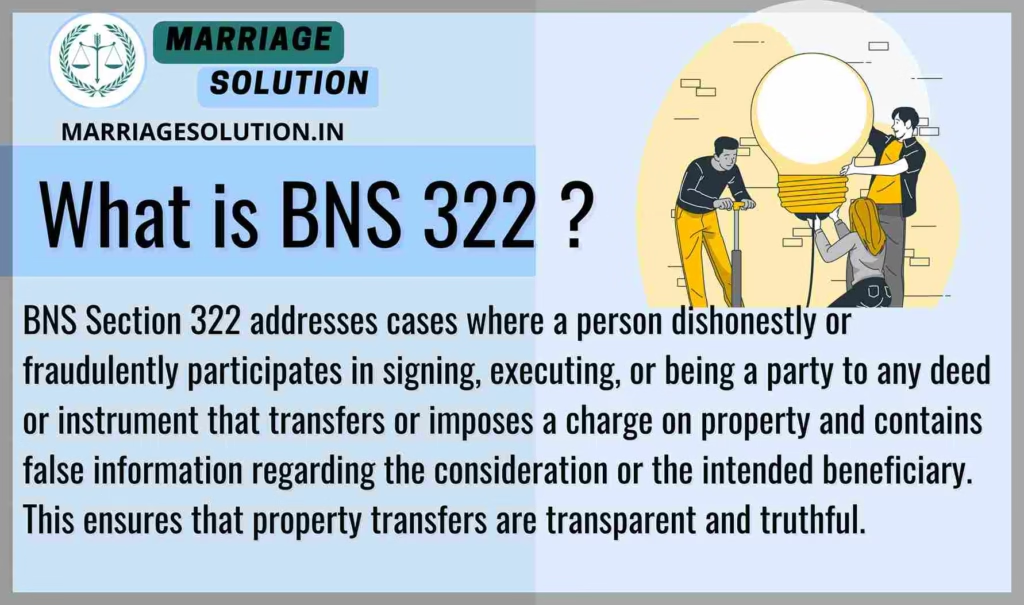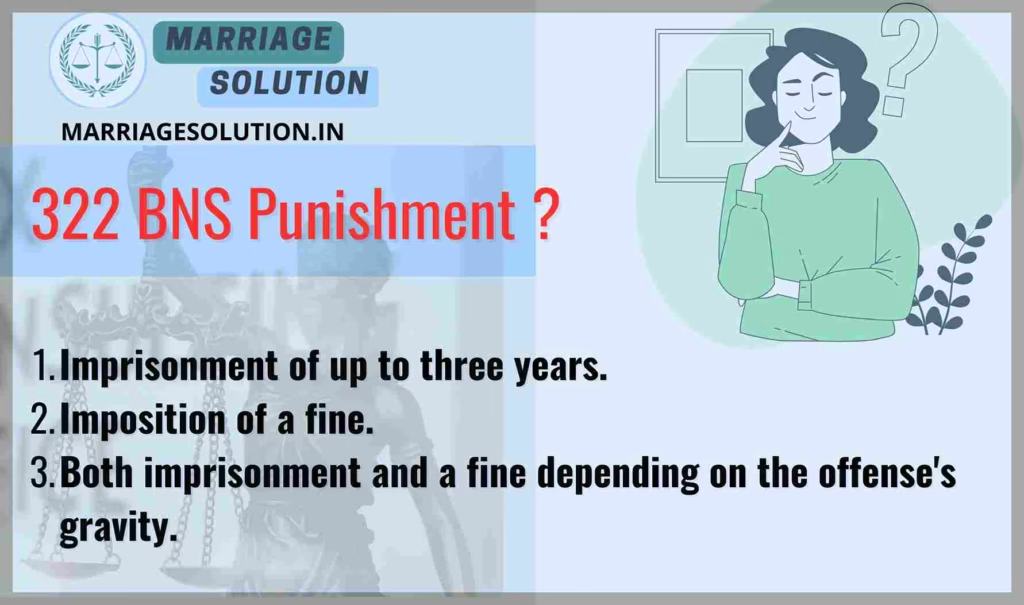Introduction of 322 BNS
322 BNS addresses dishonest or fraudulent execution of property deeds containing false statements of value or beneficiaries. This law ensures fairness in property transactions by punishing anyone who prepares, signs, or participates in a deed with fraudulent details. Replacing Section 423 of the Indian Penal Code (IPC), this provision strengthens legal safeguards for creditors, genuine property owners, and buyers, protecting them from false or misleading property documentation.
The Bharatiya Nyaya Sanhita (BNS) Section 322 replaces the old Indian Penal Code (IPC) Section 423.
What is BNS Section 322 ?
BNS Section 322 addresses cases where a person dishonestly or fraudulently participates in signing, executing, or being a party to any deed or instrument that transfers or imposes a charge on property and contains false information regarding the consideration or the intended beneficiary. This ensures that property transfers are transparent and truthful.

Under Section 322 of the bns act 2023
“Whoever dishonestly or fraudulently signs, executes, or becomes a party to any deed or instrument transferring or charging property, which contains a false statement regarding the consideration or the intended beneficiary, shall be punished with imprisonment which may extend to three years, or with fine, or with both.”
1. Meaning of Dishonest or Fraudulent Property Deeds
- This section punishes false or fraudulent statements made in property deeds or instruments.
- Fraud occurs when someone misrepresents the consideration (value) or falsely names a beneficiary in the deed.
- The law ensures that property documents are truthful and transparent.
- It covers sales, mortgages, leases, and any transfer of property that contains false information.
2. Who is Covered?
This law applies to:
- Property owners → making false claims in deeds.
- Signatories or executors → those who knowingly sign or execute fraudulent property documents.
- Beneficiaries → falsely included as recipients of property.
- Accomplices → anyone knowingly participating in the fraudulent execution of deeds.
3. Nature of the Offense
- Bailable → Accused has the right to apply for bail.
- Non-Cognizable → Police need prior Magistrate approval to investigate.
- Non-Compoundable → Case cannot be privately settled between parties.
- Triable by Any Magistrate → Heard before any Magistrate’s court.
4. Examples of BNS Section 322
- Example 1 – False Sale Consideration: A person executes a sale deed for ₹10 lakhs when the actual price was ₹20 lakhs, hiding the true value to evade taxes. → Punishable under this section.
- Example 2 – Fake Beneficiary: A property owner transfers land through a deed falsely naming a friend as owner to conceal assets from creditors. → Covered by BNS 322.
5. Punishment under BNS Section 322
- Imprisonment: Up to 3 years.
- Fine: Amount decided by the court.
- Both: In serious cases, courts may impose both imprisonment and fine.
6. Importance of BNS Section 322
- Protects against fraudulent property transfers → ensures fairness in ownership rights.
- Prevents tax evasion → by penalizing false property valuation.
- Safeguards genuine beneficiaries → stops misuse of fake names in deeds.
- Promotes transparency → strengthens trust in legal and financial transactions.
Section 322 BNS Overview
BNS Section 322 deals with fraudulent actions in property transfer deeds. If someone dishonestly or fraudulently signs, executes, or becomes a party to a deed that falsely claims certain financial considerations or benefits to individuals, they are liable for punishment. This section ensures fairness and truthfulness in property transactions.
Detailed Explanation of 10 Key Points
1. Purpose of BNS Section 322
This section is designed to ensure transparency and honesty in property transactions. It penalizes those who create or sign property deeds with false statements about the consideration (monetary or otherwise) or intended beneficiaries. By doing so, it safeguards the rights of creditors, lawful property owners, and other parties involved in transactions.
2. Definition of Fraudulent Deeds
The offense involves signing, executing, or being part of a deed or instrument that falsely represents property-related facts. These falsehoods may pertain to the amount paid or the individual for whom the deed is intended. The law ensures that only legitimate claims and considerations are reflected in property-related documents.
3. Coverage of Property Transactions
This section applies to any deed or instrument involving property transfers or charges. These transactions can include sales, mortgages, or leases. The aim is to prevent fraudulent activities that can disrupt the equitable distribution of assets or result in financial loss for other parties.
4. Inclusion of All Offender
The law holds accountable not just the person creating or signing the deed but also any individual knowingly participating in the fraudulent activity. This ensures that all parties to the fraud, including accomplices and beneficiaries of the false deed, face legal consequences.
5. Punishment for Offense
The punishment for violating BNS Section 322 includes:
- Imprisonment of up to three years.
- A fine, the amount of which depends on the court’s discretion.
- Both imprisonment and fine, depending on the severity and impact of the offense.
This penalty acts as a deterrent against fraudulent property transactions.
6. Protection Against False Beneficiaries
The section specifically targets fraudulent deeds that falsely identify the intended beneficiary. For example, creating a deed that names a fake person as the property owner to evade taxes or mislead creditors is punishable. This protects the rights of genuine beneficiaries and legal stakeholders.
7. Transparency in Financial Consideration
By penalizing false statements about the consideration involved, such as claiming a higher or lower sale value, this law promotes transparency in financial transactions. It also reduces the risk of tax evasion and ensures accurate documentation of property values.
8. Classification of the Offense
- Non-Cognizable: Police need Magistrate approval to investigate.
- Bailable: The accused has the right to seek bail.
- Non-Compoundable: The case cannot be resolved privately; a court trial is mandatory.
This classification ensures a balanced legal approach while preserving the rights of all involved parties.
9. Ensuring Legal Property Transfers
This section reinforces the legal framework for property transactions by penalizing dishonest practices. It protects individuals and institutions from being misled by fraudulent deeds, fostering trust in the property market and legal system.
10. Scope of Protection for Affected Parties
BNS Section 322 not only punishes the offenders but also safeguards the interests of creditors, rightful owners, and financial institutions. By discouraging fraudulent property deeds, it ensures that assets are distributed and managed fairly according to the law.
BNS Section 322: 2 Examples
Example 1:
A creates a property sale deed claiming the property is sold for ₹10 lakhs, but the actual consideration was ₹20 lakhs to evade taxes. This false statement about the consideration violates BNS Section 322.
Example 2:
B transfers ownership of a plot of land through a deed falsely naming a friend as the new owner to hide the property from creditors. This fraudulent representation of the beneficiary is punishable under this section.
322 BNS Punishment
- Imprisonment of up to three years.
- Imposition of a fine.
- Both imprisonment and a fine depending on the offense’s gravity.

322 BNS bailable or not ?
- Bailable: The accused has the right to seek bail.
- The offense is non-cognizable, meaning the police need Magistrate approval to investigate.
- The trial is conducted by any Magistrate.
Comparison: BNS Section 322 vs IPC Section 423
| Section | Offense | Punishment | Bailable / Non-Bailable | Cognizable / Non-Cognizable | Trial By |
|---|---|---|---|---|---|
| BNS Section 322 | Dishonest or fraudulent execution of a deed or instrument transferring or charging property that contains a false statement of consideration or false beneficiary. | Imprisonment up to 3 years, or fine, or both. | Bailable | Non-Cognizable | Any Magistrate |
| IPC Section 423 (Old) | Dishonest or fraudulent execution of a deed or instrument transferring or charging property, containing false statement of consideration or beneficiary (old IPC wording). | Imprisonment up to 3 years, or fine, or both. | Bailable | Non-Cognizable | Any Magistrate |
BNS Section 322 FAQs
1. What does BNS Section 322 address?
BNS Section 322 penalizes individuals who execute deeds or instruments involving property with false statements about the value or intended beneficiaries of the transaction.
2. What is the punishment under BNS Section 322?
The punishment can extend up to 3 years of imprisonment, a fine, or both, depending on the case’s severity.
3. Is BNS Section 322 bailable?
Yes, the offense is bailable, allowing the accused to seek bail during the legal process.
4. What type of offense is classified under this BNS 322?
The offense is non-cognizable, bailable, and non-compoundable, requiring a trial before a Magistrate.
5. Can a case under BNS Section 322 be settled privately?
No, the offense is non-compoundable, meaning it cannot be resolved through a private settlement and must go through a legal trial.
6. Who is held liable under this section?
Anyone who knowingly signs, executes, or participates in a fraudulent deed containing false statements is held liable under this section.
Conclusion
BNS Section 322 plays a vital role in ensuring honesty and fairness in property dealings. By penalizing fraudulent deeds that misstate property value or falsely name beneficiaries, the law prevents tax evasion, protects creditors, and safeguards genuine stakeholders. With punishment of up to 3 years imprisonment, a fine, or both, this section acts as a strong deterrent against property fraud. As a bailable and non-cognizable offense, it balances fair procedure with accountability. For individuals engaged in property transactions, transparency and accurate documentation are essential to avoid legal consequences under this law.
Need Legal Support?
If you are dealing with court cases, marriage problems, or any other legal issue, our team at Marriage Solution – Lawyer Help is here for you. Simply fill out our quick online enquiry form, and we’ll connect you with the right legal expert to support your needs.
Finished with BNS 322 ? Continue exploring the next provisions of the Bharatiya Nyaya Sanhita (BNS), 2023. Each section includes explanations, examples, and plain-language breakdowns for easy understanding.
- 323 BNS : Dishonest or fraudulent removal or concealment of property.
- https://marriagesolution.in/bns_section/323-bns/
Of Mischief
- 324 BNS : Mischief.
- https://marriagesolution.in/bns_section/324-bns/
- 325 BNS :Mischief by killing or maiming animal .
- https://marriagesolution.in/bns_section/325-bns/
- 326 BNS : Mischief by injury, inundation, fire or explosive substance, etc.
- https://marriagesolution.in/bns_section/326-bns/
- 327 BNS : Mischief with intent to destroy or make unsafe a rail, aircraft, decked vessel or one of twenty tons burden.
- https://marriagesolution.in/bns_section/327-bns/
Full IPC Section List: https://marriagesolution.in/ipc-section-list
All Indian Law & Blogs: https://marriagesolution.in/indian-law/
Full BNSS Section List: https://marriagesolution.in/bnss_section-list
